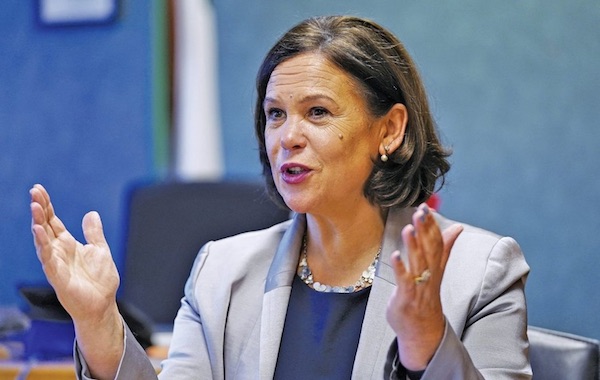
Sinn Féin leader Mary Lou McDonald has said the creation of a Citizen’s Assembly on reunification will be a top priority if her party is in a position to form the next government in Dublin.
Polls show Sinn Fein winning more than one in three of first preference votes cast if an election were held today, almost as much as the combined vote of its main rivals, Fianna Fáil and Fine Gael.
The party says its goals for Irish unity will be informed by debates and conversations to include unionists.
A Citizens’ Assembly, representative of people across the island, would be similar to bodies set up three times in the past decade. A Constitutional Convention was held between 2012 and 2014, which included representation from the North; a Citizens’ Assembly ran between 2016 and 2018 and a Citizens’ Assembly on Gender Equality was established in July 2019.
While Ms McDonald insists that “everything will be on the table” in the debate, any olive branch to unionism will not extend as far as having ‘God Save the Queen’ as an anthem in a new Ireland, she told PA news.
“That doesn’t work for me, I have to tell you,” she laughs.
“Like I say, somebody who wants to make that argument can make it. But you’re not going to hear it from me. No, I don’t think that’s a good idea at all.”
However, she believes July 12, a date when unionists mark William of Orange’s victory at the Battle of the Boyne in 1690, could be “a nice summer public holiday”.
“I think you could move beyond the kind of rancour sometimes associated, many times associated, with that time of the year” she said.
“It was very problematic in the north, as we know, and we could turn it into something positive.
“I think that could be a really interesting conversation.”
The retention of Stormont and a devolved government in Belfast is another possibility that could arise on foot of a successful border poll, though Ms McDonald worries it could replicate the mistakes of partition.
“That’s a conversation that needs to be had,” she says.
“I think in discussing that we need to keep an eye on robust democratic representation, you know, popular buy-in, people feeling empowered and represented.
“We also need to keep an eye on efficiency of delivery. We’re a small island. This is not Australia. This is not a vast territory. This is a small island.
“The objective has to be how we will get a real return, economically and socially, from reunification.
“In my view, it’s by not simply bolting the North on to the South, but creating island-wide capacity.
“Because partition has meant that duplication and we lose in that. It’s costly, it’s inefficient and it holds us back. So, we would want to be very careful about not making that mistake again.”
Some have suggested that unionist politicians should be given a quota in a United Ireland parliament, and perhaps even in government, something McDonald says should be given “careful consideration”.
She said: “Our unionist population would have a considerable representation in an all-Ireland parliament, actually much stronger than their current strength at Westminster, for example.
“So it’s certainly not something that I am advancing. But I’d like to hear the argument for it, I’d like to hear how that works out and what exactly that means.”
Support has seen increasing across the political spectrum for a national unity strategy, as well as from the Catholic Church in Ireland, led by Archbishop Eamon Martin, who said this week he would back a border poll for a United Ireland.
Recent broadcast interviews by two prominent northern figures, sports pundit Joe Brolly and civil rights campaigner and former MP Bernadette McAliskey, have also raised awareness of the historically poor response of the 26 County state to the plight of northern nationalists.
The biggest issue for unity, Ms McDonald believes, will not be around symbols, but public services such as healthcare.
“When I am out and about over many years, talking to people, and discussing the prospect of change and unity, the first thing that’s raised with me is healthcare.
“Not flags, not anthems, not any of that. The first issue that people raised with me as a matter of practical concern is, will I have to pay to see my GP?
“Will my family actually get the care that they need?
“So, I’m not denying that those issues that you’ve cited are issues of concern.
“But they’re not, in my view, where we start the conversation. In my view, we start the conversation with what kind of standard of living, what kind of standard of services do we expect and can we provide?
“Then, on the other issues, as far as I’m concerned the Irish flag is the tricolor. You know, the anthem is Amhrán na bhFiann.
“I see no merit in rejoining the Commonwealth, those are my views.”
For any border poll to take place, it must be called by the British Direct Ruler in Ireland. However, the London government continues to refuse to name a date for such a poll, or even set out the conditions necessary for it to happen.
“I want them to set out their stall publicly and then we can analyse that and we can debate it,” Ms McDonald said.
“But there has to be some indication now, officially, of how the British State or or a British Prime Minister would regard that we have arrived just a moment for the referendum to be called.
“It’s been extremely unhelpful that they wouldn’t set that out.”
![[Irish Republican News]](https://republican-news.org/graphics/title_gifs/rn.gif)
![[Irish Republican News]](https://republican-news.org/graphics/title_gifs/harp.gif)

